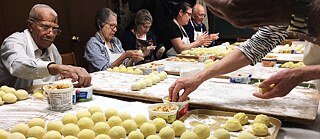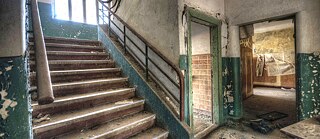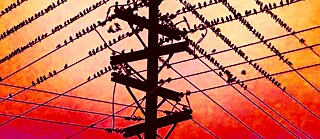Knödel in historischen Kirchenmauern
Faith, and a Side of Sour Beef
Seit mehr als 250 Jahren ist die Gemeinde der Zion Lutheran Church in Baltimore ihrem deutschen Erbe treu, das Immigrant*innen nach Maryland brachten. Dazu gehört das jährliche ‚sour beef and dumplings dinner‘ mit hunderten Kilos Sauerbraten und etwa 4.000 Knödeln.
Diese Folge anhören: Apple Music | Spotify | Download
Diese Folge stammt von Melissa Gerr. Melissa Gerr ist freiberufliche Journalistin und arbeitet als Produzentin für WYPR, den Partner von National Public Radio in Baltimore. Die Radiojournalistin lebt in Baltimore, Maryland. Melissa hat ein Händchen dafür, transatlantische Verbindungen aufzuspüren, was sie bereits in einigen Podcasts für das Goethe‑Institut bewiesen hat, wie in der Folge über das Muttersein in Deutschland und den USA. Hierkönnt Ihr mehr über ihre Arbeit erfahren. In diesem Podcast unterhält sich Melissa Gerr mit deutschen Einwander*innen und Mitgliedern der deutschen Kirchengemeinde Zion Lutheran Church in Baltimore in den USA. Die Musik für diese Folge wurde vor Ort aufgenommen. Zu hören sind der Zion Church Choir unter Leitung des Organisten John Heizer sowie Heidi und die Showband Heimatecho. Das Foto zur Folge hat Melissa Gerr aufgenommen. Es zeigt Freiwillige, die Knödel für das jährliche ‚Sour Beef dinner‘ bei der Zion Church of Baltimore zubereiten. Außer dieser Episode hat Melissa Gerr die Folgen „Wonder“ und „Welcome to Motherland“ produziert.
Transkript
Margaritte Kramer: Zion Church helped us to feel at home here. So many people did so many good things for us. And that tied us to the church. Zion, to us, has been a safe haven.
Melissa Gerr: That’s 92-year-old Margaritte Kramer who arrived at Zion Lutheran Church of the City of Baltimore as an immigrant from Germany with her husband and children after World War II.
[MARGUERITTE SINGING “EDELWEISS”]
Melissa Gerr: About 200 years before she arrived, German immigrants — just like her — founded Zion Church in 1755. It’s endured as an epicenter of community and worship throughout its 263 year history and has remained a place of refuge for immigrants and others who have come upon hard times.
[CHURCH SERVICE, PASTOR SPEAKING IN GERMAN, ORGAN MUSIC]
Melissa Gerr: Located at the corner of Lexington and Gay streets in Baltimore’s city center, the historic brick church, bell tower, and parish house are home to more than two dozen stained glass windows, exquisite wood carvings, a German-style community hall, and a newly restored 2,500 pipe organ.
[ORGAN PLAYING]
Melissa Gerr: Added to the national register of historic places in 2011, the church grounds also include a garden — which regularly performs as a Biergarten, and a small graveyard where a few notable German-Americans and pastors have been lain to rest. To this day, Zion holds services in both German and English. And within its walls, you’re just as likely to hear a rousing polka band as you are sacred organ music!
But as is the case for many religious institutions, Zion congregants are struggling to define the church’s role for the future. Currently at its helm are Pastors Eric and Anke Diebler.
Anke Diebler: Zion is an old congregation, by American standards. It is over 250 years old, and so tradition matters a lot to the people here. They’re very proud of their German tradition, as well as their Lutheran tradition.
Eric Diebler: Even though it’s so steeped in tradition, it is also a ‘Reconciling in Christ’ congregation, which means that it is open and welcoming and affirming to members of the LGBTQA community. It’s a congregation that has really been through a lot. And not always — it’s not always been easy for them, maintaining the German language, especially during two world wars, where Germany obviously was an enemy of the country. And so there was a lot of suspicion and a lot of prejudice against Lutheran congregations in general, but especially those that continued to worship in the German language. To their credit, they didn’t even have English-language worship services here until 1954. And I think that stick-to-it-iveness, which is maybe a nicer term than stubbornness ... that sense of loyalty ... is something that still here.
Anke Diebler: The stick-to-it-iveness, or tenacity, or loyalty, or faithfulness ... being a church — I think that’s a good word too — also comes from the fact that a lot of the people here are immigrants. A lot of our older pillars have been through the Second World War, have been refugees, have gone through some really hard times, and so going through hard times is something that they know how to do.
[CHOIR SINGING]
Melissa Gerr: One of those congregants who has seen Zion Church through some hard times, is Bernard Penner. Now, at age 64, he maintains the church archive, gives historic tours, and regularly participates in German and English services, among lots of other volunteering. Bernie, as fellow congregants refer to him, literally grew up at the church — he lived on the premises while his father was pastor, from 1963 until 1984. He’s dedicated to Zion and all that it stands for, but he holds a realistic view of its strengths and weaknesses.
Bernard Penner: There are enough Lutheran churches around, and in a way, Zion’s location downtown is a detriment. So if you didn’t have the German language, I think you would have even less to no people there at all. So for Zion the German language is essential. We even have in our constitution that the pastor has to be fluent in both languages. But if we were to abandon German, I think Zion probably ... I think the market is sufficiently thin now, that I think Zion as a congregation — as a living congregation — would probably cease to exist.
[CHOIR SINGING]
Bernard Penner: The building has its significance, and I think the building is remarkably beautiful. There is something special about that space and all of that that sort of keeps us there. I think if it was just a run-of-the-mill thing, I think the congregation would have moved out a long time ago. Now the question of how long we’ll hold on — that is yet to be decided. As long as we have people who are willing to put in the love and time to make it go, it’ll go. But ... we’ll see. We’ll see.
Melissa Gerr: When it comes to looking for people to put in the love and the time, look no further than Zion’s annual sour beef and dumplings dinner that happens each October.
[VOICES OF CROWD WORKING, UTENSILS]
Melissa Gerr: For more than 80 years, a small army of volunteers descends into the basement kitchen to work for weeks in advance. The task? The preparation of hundreds of pounds of sour beef, about 4,000 plump, tender dumplings, and gallons of gravy. The woman in charge this year, and for the past five years, is Leslie Trageser.
Leslie Trageser: So get your coat off, let’s get going. Alright! Somehow we’re running out of aprons. There’s actually eight steps to the meat itself. Eight steps. We buy the meat. We trim the meat. We marinate the meat. Oh and then I have to rotate the meat, halfway through the marinating process — we have to rotate the meat because sometimes it’s not marinated all the way through. Then we brown the meat. Then we cook the meat, then we slice the meat, and then we cube the meat.
Melissa Gerr: And how much meat are we talking about?
Leslie Trageser: We are talking about 500 pounds.
Melissa Gerr: Of beef?
Leslie Trageser: Of beef.
Melissa Gerr: Yes, I will let you get to work. [LAUGHS]
[SOUNDS OF MARINADE BEING POURED, WATER SPRAY]
Leslie Trageser: Every year the meat might be a little different so it comes out a little different — so we’re always trying to make it better for the next year. You learn every year.
Melissa Gerr: And hundreds of people come here, so I think you’re doing something ...
Leslie Trageser: Thousands.
Melissa Gerr: Thousands? Oh wow.
Leslie Trageser: Between a thousand and 1,400 people come here over two days.
Melissa Gerr: Well you must be doing something right — a lot of things right.
Leslie Trageser: Well, they keep coming back, and we’re proud of what we do here. We have a lot of wonderful people and it’s a team effort all the way, and I couldn’t ask for a better group of people. It’s really wonderful.
[DUMPLING WORKERS SOUNDS]
Melissa Gerr: In a small room adjacent to the kitchen, the ‘Zion dumpling brigade’ is busy perfecting thousands of the plump orbs, each about the size of a pool ball.
[EGGS CRACKING, MIXING BOWL SOUNDS]
Melissa Gerr: One batch requires ten eggs and plenty of muscle to beat them in and form the dough. Then, it takes on an assembly-line-like process ...
Volunteer 1: And then we take the balls and insert one crouton, and then form as perfectly a ball as we can. Because if it has smileys — a crack — then it will open up in the boiling water and it will break, and then nobody wants to eat it. So you have to take time to make it as smooth as possible. And that’s it. And then they sit and dry a little bit. And then the wonderful ladies in the kitchen pop them into the boiling water, and in two minutes they’re done and then you come and eat.
Melissa Gerr: And then they’re doused in that gravy.
Volunteer 1: Ah, that’s the best. The gravy is the best ... yeah ...
[SOUNDS OF WORKERS AND INSTRUCTION HOW TO FORM THE DUMPLINGS]
Melissa Gerr: Dozens of volunteers show up (this year from as far as North Carolina and Wisconsin!) to help make the sour beef event a success.
Volunteer 2: We’re doing it now for three years.
Melissa Gerr: And have you been a part of the Zion community for longer than that?
Volunteer 2: Nay, I’ve been a guest because we are Catholics. But I love it here, this is like a family. So I’ve been here all the time and if they need help I’m coming and helping.
Melissa Gerr: That’s great! And your dumplings look amazing.
Volunteer 2: Thank you!
Volunteer 3: This is my tenth year of doing it, maybe like ... between seven and ten years. But my mom is Leslie Trageser so she’s the head of this whole crazy operation.
Melissa Gerr: And she’s still standing.
Volunteer 3: Yes, she’s still standing, yes. [LAUGHS] I mean not only is it special for me to be with my mom, but I think just the fact that this is such a long tradition — from that tradition, a community is created and grows.
Brigitte: My name is Brigitte, and Americans have a very hard time pronouncing it.
Melissa Gerr: You’re a member of the congregation of Zion Church?
Brigitte: I’ve been coming here since literally since 62 years.
Melissa Gerr: How long have you been making dumplings?
Brigitte: Well, oh yeah. Several decades.
Melissa Gerr: What do you like about being here? I know you come back every year.
Brigitte: Well, liking — that is something different, I’m just doing the work. [LAUGHS]
Melissa Gerr: It’s just the task that needs to be done for you?
Brigitte: Right, right. It needs to be done, exactly. And with all the customers we are having, you know they want to have dumplings.
Melissa Gerr: Well, it seems like there’s a lot of camaraderie in the room.
Brigitte: Yes, because we know each other for a long time. And if we don’t know each other, we know the parents and the grandparents.
Melissa Gerr: How would you describe the taste of the whole sour beef meal to someone who hasn’t had it?
Brigitte: To tell you the truth: Personally, I never liked sour beef because I come from an area in Germany — Eastern Germany — we never made sour beef. I know they are from different areas. In my area, my mother ... I didn’t know about sour beef until I came to Zion church.
Melissa Gerr: Actually, Zion Church is how a lot of people in Baltimore first hear about sour beef. For two days, the church common areas are transformed — filled with hungry diners as well as the smells and sounds of a real German beer hall ...
[BAND MUSIC AND SPEAKING]
First diner: We’ve never been here before — this is our first time.
Melissa Gerr: There’s a lot of people here for their first time. How did you find out about it?
First diner: I’ve heard about this event for years and have wanted to come. And I’ve read about it, and I finally found someone who wanted to come with me. It’s great! And the people-watching is really fun. I like all the families with the little kids and I wore my German shirt that I got in Munich 30 years ago [LAUGHS].
Second diner: I’m 57, so I’ve been here 56 times ... literally. Maybe missed one or two years. I volunteer, I was baptized here, and confirmed here. I volunteer, and we don’t miss the sour beef and dumplings.
Melissa Gerr: So you are a member of the congregation?
Second diner: I am officially. Now that we live further out in the country, we tend to go to a Lutheran church further up north, for my kids and such. But my grandmother and grandfather from both sides were German immigrants that immigrated through this church — and worked as indentured slaves in Towson, on farms, for their boat passage to America. A lot of heritage here. But it’s a great event all the time, and it’s growing, and I’m not sure we can accommodate how many people ... this is growing still. As you can see, the hall is full, and in another half hour downstairs will be full.
[BAND MUSIC]
Third diner: We are big fans of the sour beef dinner. We have been coming for about ten years with our family.
Melissa Gerr: Are you members of the congregation?
Third diner: We’re not, we are simply fans of ... well, we’re fans of the church. I mean, it’s a really lovely community. They’re really welcoming every year. It feels like a family when you walk in, so we’ve felt a part of the church even though we’re not.
Melissa Gerr: Who did you bring with you here tonight?
Third diner: I brought my parents; I also brought my husband and my two kids.
Melissa Gerr: In ten years have you seen any changes?
Third diner: It’s been delightfully the same for ten years [LAUGHS]. We enjoy that as a family. We enjoy things that are the same — and ritual and routine, and family tradition — so it feels very much a part of that. We love the sides, in addition to the sour beef and dumplings — the purple cabbage. I don’t know what they would call that? It’s fantastic, the sour cabbage. There’s always rolls and butter, there’s also green beans ... and you always get dessert. The star, of course, is the sour beef and dumplings.
Melissa Gerr: How would you describe sour beef and dumplings to someone who had not ever tasted them?
Third diner: Sweet and sour, a little bit snappy. Like, pungent or spicy ... probably from the ginger snaps in there.
Melissa Gerr: The ginger snaps are in the gravy ...
Third diner: In the gravy, yeah. I love the gravy. It’s definitely comfort food, too — stick to your ribs, fill you up fast.
Melissa Gerr: Have you ever tried to make it?
Third diner: Once. [LAUGHS]
Melissa Gerr: And then you just said: never mind, we’ll just wait till next year?
Third diner: Right. We’ll just wait. Right. It makes it even more exciting then, when it comes around.
Third diner’s father: After she tried it, we said: let’s make a tradition of coming down here!
[BAND MUSIC, APPLAUSE]
Melissa Gerr: The sour beef dinner, beer and brats in the garden, the Christmas market, German language classes ... those are all are some the things that endear Zion to greater Baltimore and establish its place in the city. But Christy Vogt Luis, whose connection to the church reaches back to her great-grandfather — also a German immigrant — speaks to other ways Zion has quietly and consistently woven itself into the fabric of the community.
Christy Vogt: Our role in the community here is: we try to be a safe haven, if that makes sense. When our doors are open, you can come in. And if it’s just to use a restroom, or get warm or whatever, we are here. We hand out lunches every day. We found out about this kid, who is 18. He is a graduate from Poly Tech; he graduated top of his class, and you kind of don’t know what happened — you don’t want to push too much. But when he told us he didn’t want to stay in the shelter because of things he’s seen, it just broke all of our hearts. And everybody’s come together, there’s been furniture donated, there’s been food donated, clothes, a bed. Yes, we’re in the middle of the city, and times have changed, so you really have to watch — like we get phone calls all the time like: hey can I have 20 bucks, I’m broke — and they’re out buying crabs or something like that. But at the end, that’s what we’re here for. We’re here to help people.
[ORGAN MUSIC AND PASTOR SPEAKING DURING SERVICE]
Melissa Gerr: In many ways, Christy represents the future of the church. She was baptized, confirmed and married there, and has children who are following in her footsteps. She holds one of those ‘glue’ positions on staff — she’s involved in almost every level of administration, from assistant to the pastors to treasury duties. But the future of Zion is still getting sorted out. Here’s Bernie Penner.
Bernard Penner: I think we’re at a point where, if we can get help maintaining the physical plant, the buildings and the grounds — because they’re old, they’re worth saving but it’s expensive, and so if we can get help from the city, from the state, keeping this piece of significant history alive — I think the congregation stuff will take care of itself. There are enough people who still want German worship, and I think it’s a part of Zion’s future and the conscious decision they made. We are becoming the last authentic place for German heritage in Baltimore.
[ORGAN MUSIC]
Melissa Gerr: Pastor Anke and Pastor Eric also weigh in on Zion’s future:
Eric Diebler: When we first got here, this congregation had just been through a very difficult time with their leadership. The previous pastor had left under less than positive circumstances, so there was a lot of anxiety. They were not doing very well financially. And so there was a great fear that it wasn’t going to be too long before they would be closing. Really, the first challenge was addressing that, and getting them to see past the immediate crisis to have a sense of: yes, we still do have a future here and we can continue to do meaningful work here.
Melissa Gerr: And so how did that go? You’re still here and Zion is still here ...
Eric Diebler: Yep, we’re still here. It’s three and a half years later. Things have improved financially, which is nice, and that anxiety — because of that — has been greatly reduced. And now we’re starting to talk more about: ok so we’re here, why are we here, and what are we called to do located in this place. Being located where we are — at the intersections of literally the city government, right across the street, and Healthcare for the Homeless is just down the street, and there’s the burgeoning community in all of the old office buildings that are directly to the side of us — so yes, it’s an interesting place to be.
Anke Diebler: And so we are now in the process of determining what our call might be, in terms of reaching out to this new kind of neighborhood that is here. And what kind of church do we need to be that, say, millennials, or the homeless, or the people working in the government offices around us — will find this a place where their faith can be nurtured and they can find community.
Melissa Gerr: And whether or not the German aspect of that is going to be the driving force or not?
Anke Diebler: Yes, we need to learn how to take our German heritage and build on that. In a way that might not be exactly German in language, but maybe in character and in history, the values of German culture ...
This Sunday, we’re celebrating Reformation Sunday. We remember Martin Luther reforming the church, and one of Martin Luther’s slogans was that the church constantly needs to reform itself to stay relevant. And that’s what we’re in the process of doing now — reforming ourselves — so that we remain a relevant voice for God, as well as for the German heritage that we can offer the community.
[ORGAN MUSIC AND BELLS]







